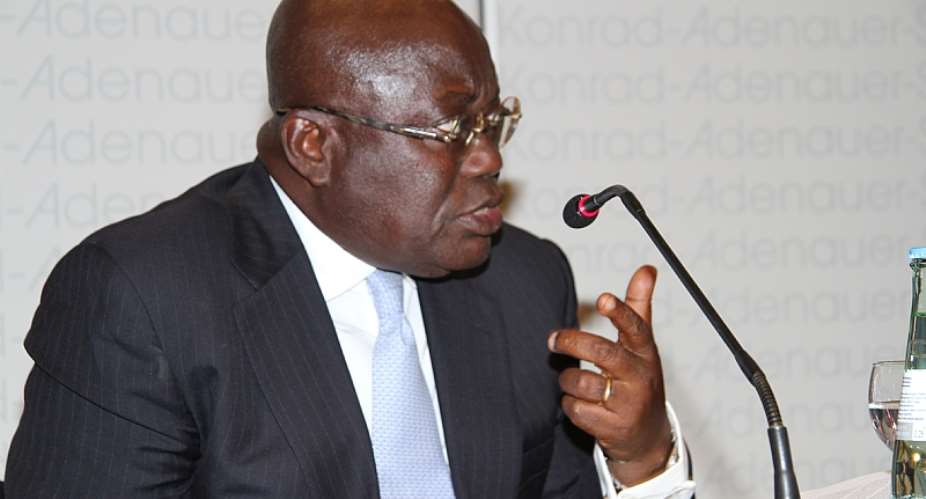The professional qualification of Nana Addo Dankwa Akufo-Addo, the NPP’s Presidential Candidate, has once again surfaced even after a case challenging his status as a lawyer was dismissed by the court. Below is a what Prof. Kwaku Asare, a US-based Ghanaian professor writes about the matter:
What Joseph Kwesi Armah Agyekum sent me: “Can someone be a lawyer without attending law school?”
Me: The short answer is yes. But let me state that the question itself is not properly formulated. This is because there are no universally accepted routes to becoming a lawyer. So the question must be modified to include the jurisdiction (which country?) and period (what year?)
In the Gold Coast and early years of Ghana, most of our lawyers trained in England under the apprenticeship system, called the Inns of Court. That is, they were attached to a lawyer who provided them with training. No law degree or indeed any degree was required to train as a lawyer.
So for instance, Speaker Bamford Addo, who was a Justice of the Supreme Court, trained as a lawyer at the Inner Temple Inn. She did not have a law degree or, if my memory is correct, a degree at all. Her highest academic qualification was at Holy Child. The same is true of Justice Sowah whose highest academic qualification was at Achimota and who trained at the Gray Temple Inn. Similarly, Nana Akuffo Addo, who has a degree in Economics, trained at the Middle Temple Inn, qualified as a lawyer in UK in 1971 and enrolled at the Ghana Bar in 1975 (see link below for lawyers enrolled in 1975). Incidentally, other famous lawyers, such as Justice Marshall of USA, did not have law degrees and qualified under the same apprenticeship model, which the English exported to USA.
In fact, when the current Ghana School of Law was set up in 1958 at Makola, the purpose was to train non-degreed civil servants to become lawyers. Geoffrey Bing saw it is an instrument to quickly train lawyers to act as a check against the then UGCC lawyers, all of whom were trained in UK under the apprenticeship model.
It was the Denning Committee, set up by her majesty, and the Gower Committee, set up Nkrumah, that recommended a university degree as a prerequisite for training as a lawyer in Ghana. Both reports were instrumental in setting up the Faculty of Law at Legon, leading to the current bifurcated legal education system, which includes the academic component at a University followed by a professional component at Makola or an equivalent professional school. The Law Faculty at Legon admitted its first batch of students in 1959.

Prof. Kwaku Asare, a US-based Ghanaian professor
That is, every student who enrolls in a law faculty in Ghana is deemed to have enrolled in a joint academic/professional program that starts at the University and ends at the Ghana School of Law. The only constraint is to get the LLB degree, pass 7 courses and be of good character!
Of course, even today, the law degree is not the only path to becoming a lawyer in Ghana and students with other degrees can access the professional qualification by taking various entrance exams. Similarly, the post call program continues to allow lawyers from other jurisdictions, with a legal system analogous to ours, to be called to the Bar although these days they have to pay thousands of dollars and pass exams in constitutional law and customary law.
The same is true in USA where States like California, Virginia, Vermont, and Washington do not require a law degree before one is called to the Bar. I think 2 years of undergraduate education suffices in California.

Nana Addo Dankwa Akufo-Addo, (sanding 6th from left) when he was called to the bar
To sum up, most old time lawyers in Ghana had no law degree or in some cases degrees at all. But most of them were extremely competent.
The task that our generation faces is not to mindlessly question the credentials of some of our most accomplished lawyers. The question we face is why we cowardly allow the General Legal Council to deny those with Law degrees access to professional education, contrary to law.
Da Yie!
Follow the link below for the roll of lawyers called to the Ghanaian bar in 1975:
https://www.dropbox.com/s/cgmz22zwap69plq/roll%20of%20lawyers%201975.xlsx?dl=0





 There’s nothing you can do for us; just give us electricity to save our collapsi...
There’s nothing you can do for us; just give us electricity to save our collapsi...
 Ghanaian media failing in watchdog duties — Sulemana Braimah
Ghanaian media failing in watchdog duties — Sulemana Braimah
 On any scale, Mahama can't match Bawumia — NPP Youth Organiser
On any scale, Mahama can't match Bawumia — NPP Youth Organiser
 Never tag me as an NPP pastor; I'm 'pained' the 'Akyem Mafia' are still in charg...
Never tag me as an NPP pastor; I'm 'pained' the 'Akyem Mafia' are still in charg...
 Your refusal to dedicate a project to Atta Mills means you never loved him — Kok...
Your refusal to dedicate a project to Atta Mills means you never loved him — Kok...
 2024 elections: I'm competent, not just a dreamer; vote for me — Alan
2024 elections: I'm competent, not just a dreamer; vote for me — Alan
 2024 elections: Forget NPP, NDC; I've the Holy Spirit backing me and nothing wil...
2024 elections: Forget NPP, NDC; I've the Holy Spirit backing me and nothing wil...
 2024 elections: We've no trust in judiciary; we'll ensure ballots are well secur...
2024 elections: We've no trust in judiciary; we'll ensure ballots are well secur...
 Performance tracker: Fire MCEs, DCEs who document Mahama's projects; they're not...
Performance tracker: Fire MCEs, DCEs who document Mahama's projects; they're not...
 Train crash: Railway ministry shares footage of incident
Train crash: Railway ministry shares footage of incident
